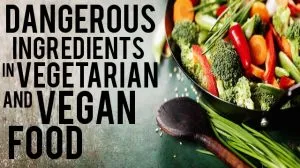Yes, the word “food” deserves to be put in quotation marks here. The word “product” is really more applicable in this case. Prepared vegetarian and vegan edibles are engineered products, which technically can be digested by the human body and may provide some excuse for nutritional fuel, but they don’t come close to real, whole, natural food.
Let’s take a closer look at some typical veggie burger patty ingredients.
Textured vegetable protein, soy protein isolate, soy protein concentrate:
- These are processed thermo-formed protein products usually made from GMO corn or soy.
- Vegetable gum, maltodextrin, methylcellulose: Binders and stabilizers to make disparate ingredients stick together.
- Natural flavor: The components of which can legally be kept secret if it is claimed to be proprietary by the manufacturer.
- Yeast extract compounds, Disodium guanylate, disodium inosinate, succinic acid: Chemicals similar to MSG which stimulate taste receptors to enhance the perception of flavor.
Sunflower oil, soybean oil, corn oil: These are inflammatory industrial oils processed under high heat and pressure. - Hexane: A byproduct of gasoline refining which is used to extract proteins from soy to create a meat-like texture. The Center for Disease Control and Prevention has classified hexane as a neurotoxin, but hexane use in food manufacturing is not currently regulated by the FDA.

A suggestion for the ethical, environmental and health-conscious person would be a nice natural, organic, pastured, humane-certified meat patty, or wild-caught sustainable fish patty. That’s what our ancestors would have chosen! They likely wouldn’t even recognize that chemical-laden veggie burger as food.
If you need a vegetarian option for entertaining or the occasional meatless day, try making homemade veggie burgers out of grated zucchini or Portobello mushrooms.
If you are able to digest legumes comfortably, lentils are a solid choice that are high in vegetable protein. The best way to consume lentils is after having soaked them overnight and then sprouted them for 24–36 hours until they have grown a short “tail.”
At this point the lentil will have given up its inflammatory phytic acid compounds that are meant to protect its reproductive capabilities while it travels through your digestive tract. Be sure to rinse the sprouted lentils well with vinegar and/or grapefruit seed oil to remove any nasty pathogens that may have moved in during the sprouting process.
Then you can make them into delicious vegan burgers using this simple recipe:
Ingredients
- 1 cup uncooked lentils
- 1 cup uncooked brown rice
- 1 1/2 cups carrots, finely grated
- 1/2 tsp garlic powder
- 1 1/2 cups uncooked oatmeal
- 1 tsp season salt
- 1 small onion, finely grated
Instructions
1. Cook lentils and rice in 4 cups of water for 45 minutes, simmering over a low heat in a covered pan. Allow to cool.
2. Add remaining ingredients and mix well. Shape into 8 patties and cook on a griddle or pan in coconut oil over a medium heat, until nicely browned (about 6 minutes per side).
-The Alternative Daily
Sources:
http://onlinelibrary.wiley.com/doi/10.1111/j.1365-2621.2002.tb10321.x/abstract
http://www.care2.com/greenliving/whats-inside-your-veggie-burger.html
http://www.huffingtonpost.ca/2012/09/20/7-unhealthy-foods-vegetarians-eat_n_1897146.html
http://www.epyk.com/441/vegan-doesnt-mean-healthy-5-vegetarian-foods-you-should-never-eat
http://plenteousveg.com/vegan-processed-foods
http://recipes.sparkpeople.com/recipe-detail.asp?recipe=6394
